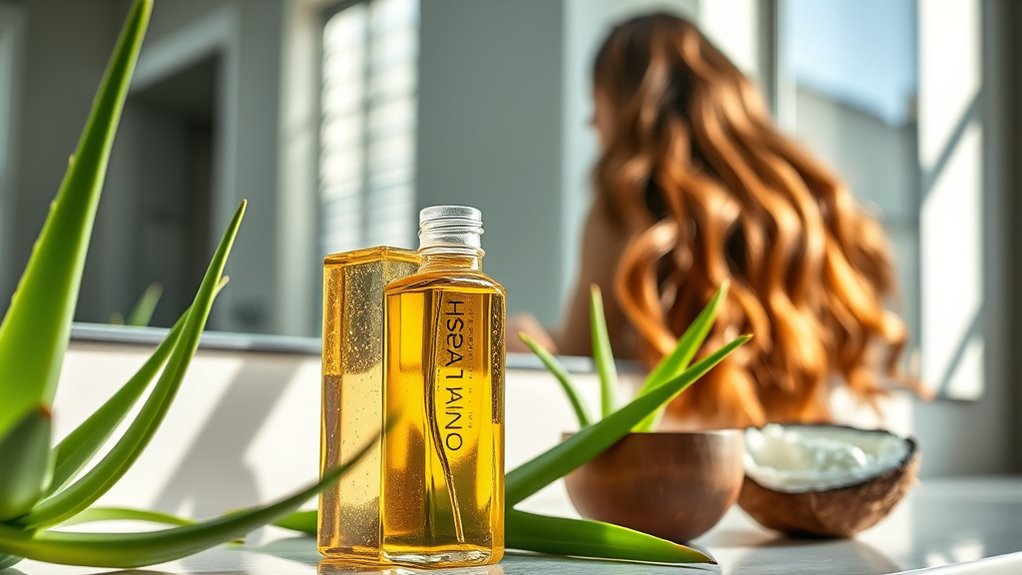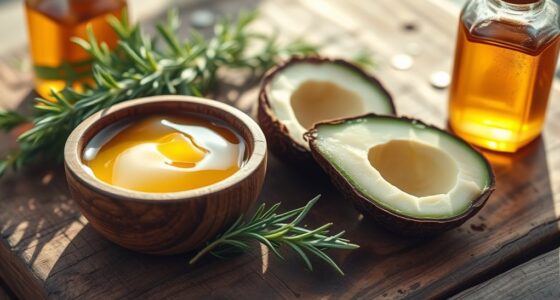To repair sun-damaged hair, start with moisturizing shampoos and conditioners that restore hydration. Apply leave-in conditioners to retain moisture and use deep conditioning treatments with natural oils like coconut or argan oil weekly for added nourishment. Protect your hair from future damage by using UV-blocking products and wearing hats when out in the sun. Don’t forget to maintain a balanced diet full of essential nutrients for healthy hair. Keep going to discover more effective tips for your hair care routine!
Key Takeaways
- Use moisturizing shampoos and conditioners to restore hydration and improve the texture of sun-damaged hair.
- Incorporate weekly deep conditioning treatments with natural oils like coconut and argan for enhanced moisture retention.
- Apply UV-blocking hair products and wear protective accessories like hats to shield hair from further sun exposure.
- Maintain a balanced diet rich in vitamins and omega-3 fatty acids to support overall hair health and repair.
- Perform regular scalp massages to boost circulation and promote hair growth, enhancing scalp health and moisture retention.
Signs of Sun-Damaged Hair
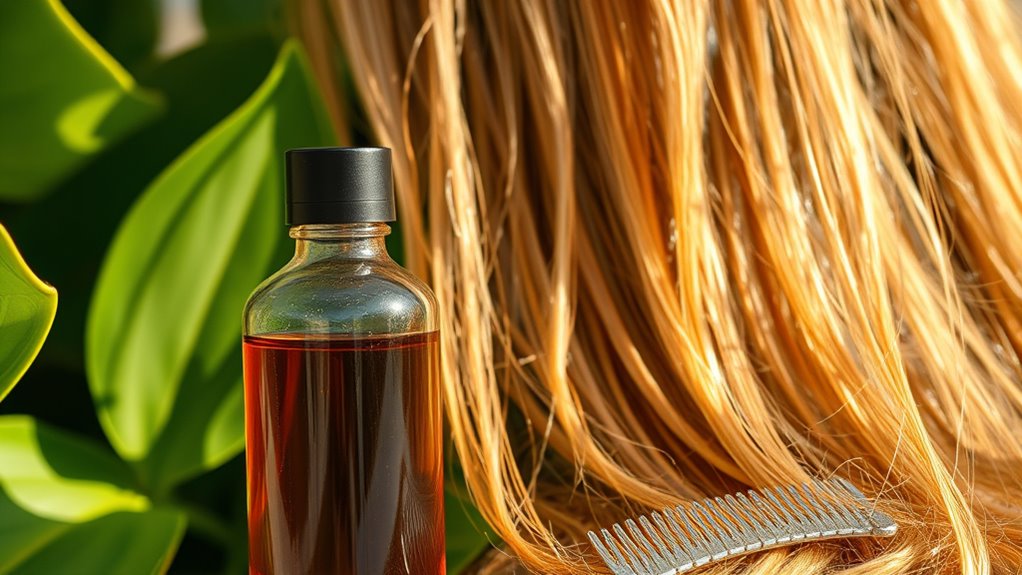
Sun-damaged hair can be a real struggle to manage. You might notice increased frizz and breakage, making your hair feel delicate and prone to snapping.
A rough texture and split ends are often telltale signs of sun damage. If your hair looks dull and lacks shine, that’s another indicator of moisture loss, showing it’s lost its radiance. Additionally, the consumption of raw foods, such as fresh fruits and vegetables, has been linked to enhanced skin health, which may also benefit your hair. Maintaining a balanced diet rich in fruits and vegetables can also support hair health. It’s important to ensure you are not experiencing any nutrient deficiencies that could further impact your hair condition. Moreover, staying hydrated is essential for overall well-being and can help improve hydration levels in your hair.
High porosity can make your hair absorb and release moisture quickly, leading to further damage. Additionally, if you see discoloration or fading in treated hair, it’s likely due to UV rays breaking down pigments, leaving your locks looking washed-out.
Recognizing these signs early can help you take action to restore your hair’s health and liveliness. Regular hydration techniques, such as using hydrating face masks, can significantly improve moisture levels and overall hair condition.
Understanding Permanent Damage From Sun Exposure

When you spend extended periods in the sun, your hair can suffer irreversible damage that affects its overall health and appearance.
Prolonged exposure to UV rays breaks down the protein bonds in your hair, leading to increased brittleness and a weakened hair structure. This keratin breakdown results in split ends and frayed hair shafts, making your locks look unhealthy. Additionally, using HEPA filters in your home can help reduce airborne pollutants that may exacerbate hair damage. Maintaining a healthy diet rich in nutrient availability can also support hair resilience against environmental stressors.
Over time, sun damage can also cause discoloration and dullness, especially in color-treated hair. Continuous sun exposure alters your hair’s texture, leaving it rough and coarse, ultimately making it difficult to manage. Additionally, the focus on scalp health is essential for overall hair wellness, as a healthy scalp can mitigate some sun-related damage.
Understanding these effects of permanent damage can help you take preventive measures to protect your hair from further harm.
Importance of Hydration and Deep Conditioning
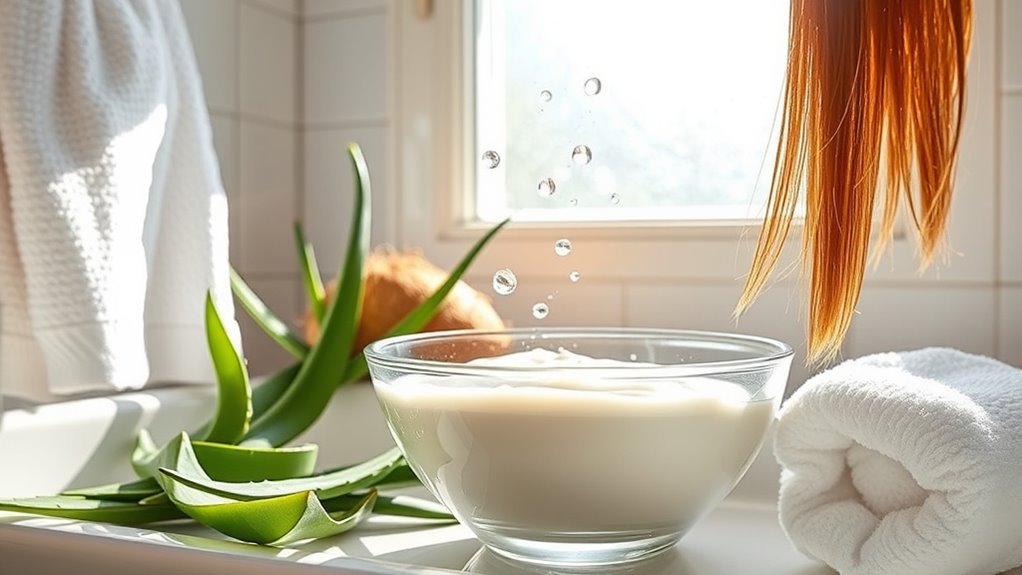
To restore sun-damaged hair, hydration and deep conditioning are key. You’ll want to explore deep conditioning treatments, natural oils, and establish a weekly moisture restoration routine to keep your hair healthy and vibrant. Additionally, proper airflow around your hair while it dries can enhance moisture retention and prevent further damage. Incorporating omega-3 fatty acids into your diet can also support overall hair health from within, as these nutrients are linked to improved cognitive function and mood enhancement, which can contribute positively to your overall well-being. Consuming foods rich in vitamins and minerals can further improve the condition of your hair. Regular use of essential oils can also help stimulate hair follicles and promote growth, enhancing the overall health of your hair.
Deep Conditioning Treatments Overview
Although exposure to the sun can wreak havoc on your hair, deep conditioning treatments play an essential role in restoring its health. These treatments are crucial for combating dryness and brittleness caused by UV exposure.
Regularly using hydrating masks with Argan or Coconut oil helps restore moisture and strengthen your strands.
- Enhance shine and texture
- Make hair more manageable
- Reduce breakage
- Provide long-term protection
Incorporating deep conditioning treatments into your weekly routine not only improves your hair health but also guarantees it remains resilient against environmental damage.
Products like leave-in conditioners and intensive masks, such as the Moroccanoil Intense Hydrating Mask, can deliver the moisture your hair craves while revitalizing its overall appearance.
Natural Oils for Hydration
Natural oils play an essential role in hydrating sun-damaged hair, as they penetrate deeply to restore moisture and nourishment. Oils like coconut, argan, and jojoba are rich in fatty acids and antioxidants, making them excellent for enhancing moisture levels. Additionally, brewing methods that incorporate natural ingredients can further support hair health. Using oils that are known for their energy-saving features also contributes to overall hair vitality. Regularly using oils that promote healthy dog behavior can also enhance your overall well-being.
By incorporating these natural oils into your routine, you can improve elasticity and repair hair affected by dryness. A weekly deep conditioning treatment with warmed coconut oil can greatly enhance texture and reduce brittleness. Furthermore, maintaining proper nutritional balance is crucial for supporting hair health from within.
Jojoba oil, closely resembling your scalp’s natural oils, provides essential hydration and nourishment. Additionally, these oils form a protective barrier against future UV damage and moisture loss, ensuring your hair stays healthy and vibrant even after sun exposure. Many people find that using no-sugar-added brands of beverages, such as coconut water, can also help with hydration and recovery for overall hair health.
Weekly Moisture Restoration Routine
Maintaining hydration is key to repairing sun-damaged hair, and a weekly moisture restoration routine can make a significant difference. Incorporate deep conditioning treatments, like a hydrating hair mask, to restore moisture and enhance your hair’s texture. Regular hydration not only revitalizes your hair but also contributes to overall healthy lifestyle choices. Additionally, using products rich in omega-3 fatty acids can further nourish and strengthen your hair. Chia seeds, for example, are an excellent plant-based source of omega-3s that can support your overall health.
Here are some tips to guarantee effective hydration:
- Use products with natural oils, such as coconut or argan oil.
- Apply a nourishing hair mask for at least 5-7 minutes weekly.
- Include leave-in conditioners to maintain hydration throughout the week.
- Stick to a consistent routine to boost hair health and resilience.
- Consider using products with glycolic acid to aid in exfoliation and promote scalp health. Regular use of glycolic acid products can also improve overall hair texture and shine.
Protective Measures to Shield Your Hair
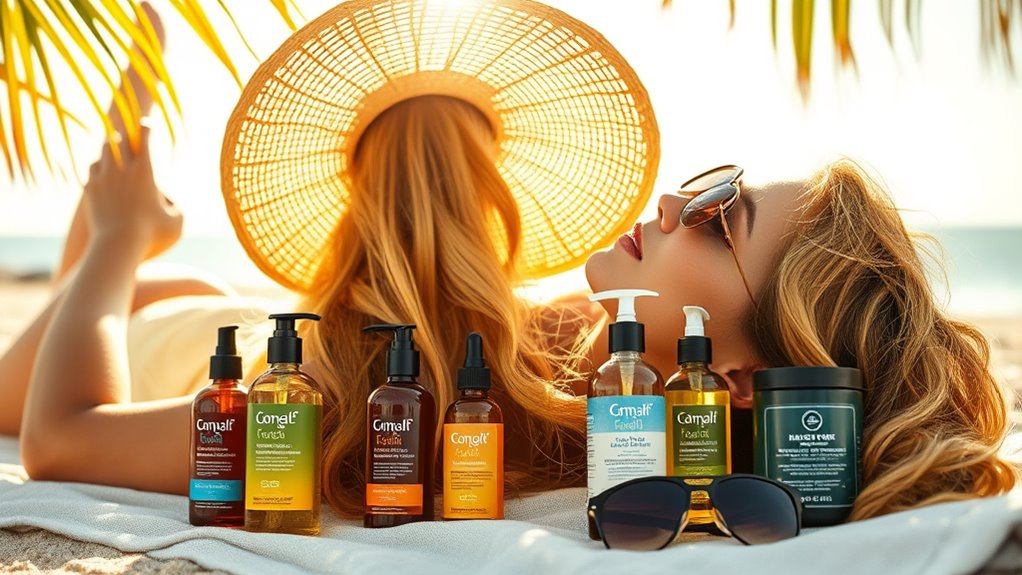
To shield your hair from the sun’s harmful rays, start by applying UV-blocking hair products like leave-in conditioners and sprays before heading outdoors. These products provide essential sun protection and help lock in moisture.
To further protect your hair, wear wide-brimmed hats or scarves to block direct sunlight during outdoor activities. Limiting sun exposure between 10 AM and 4 PM can also minimize the risk of damage.
Regularly incorporate hydrating shampoos and hair masks into your routine to bolster your hair’s defenses against UV-induced dryness. Don’t forget to schedule regular trims to remove split ends, maintaining overall hair health and reducing the risk of further damage.
These protective measures will keep your hair looking vibrant and strong.
Nutritional Support for Healthy Hair

To boost your hair’s health, focusing on essential vitamins and a balanced diet is key.
Incorporating foods rich in vitamins A, C, E, and biotin can enhance growth and strength, while protein sources provide the building blocks for keratin.
If you’re struggling to get these nutrients from food alone, consider adding supplements to support your hair’s recovery.
Essential Vitamins for Growth
Healthy hair relies heavily on the right nutrients, and essential vitamins play a vital role in supporting growth and recovery from sun damage. To achieve that luscious, strong hair, focus on incorporating these vitamins into your routine:
- Vitamin A: Promotes healthy scalp and hair follicles.
- Vitamin C: Aids collagen production, strengthening hair strands.
- Biotin: Essential for keratin production, it helps prevent hair loss.
- Omega-3 Fatty Acids: Hydrate the scalp and reduce inflammation.
Don’t forget about Vitamin D, which is linked to the hair growth cycle.
Balanced Diet Importance
Nourishing your hair goes beyond just vitamins; a balanced diet plays a significant role in its overall health. To promote hair growth and maintain hair health, include foods rich in vitamins A, C, E, biotin, and omega-3 fatty acids.
Spinach, sweet potatoes, avocados, and fatty fish provide essential nutrients that strengthen and enhance the elasticity of your strands. Remember, deficiencies in specific vitamins and minerals can lead to increased hair loss and brittleness.
Incorporating protein-rich foods like eggs, legumes, and nuts is vital since hair is primarily made of keratin. Finally, don’t underestimate hydration; drinking enough water daily guarantees your hair follicles receive the moisture they need for ideal growth and repair.
Supplements for Hair Health
While a balanced diet is essential for hair health, supplements can provide the extra boost your strands need to recover from sun damage.
Consider adding these to your routine:
- Biotin: Improves hair thickness and shine.
- Omega-3 Fatty Acids: Supports scalp health and reduces inflammation.
- Zinc: Maintains healthy hair follicles and prevents hair loss.
- Vitamins A, C, E, and D: Crucial for the hair growth cycle and overall hair vigor.
These supplements can enhance your hair’s resilience and promote recovery from sun exposure.
By prioritizing these nutrients, you’ll support not just your hair’s appearance, but also its overall health.
Steps to Limit Damage From Hair Treatments
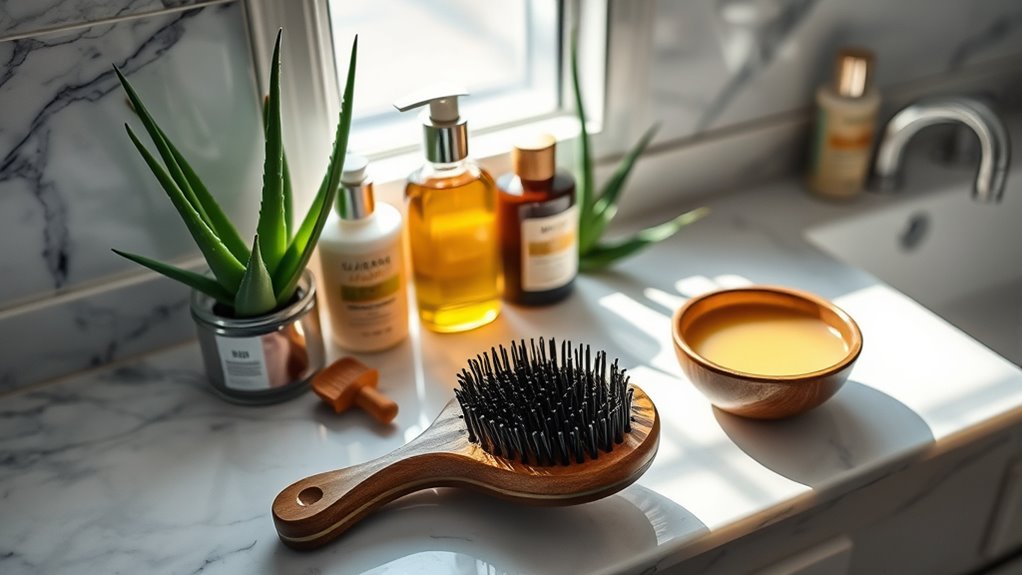
To limit damage from hair treatments, it’s essential to make smart choices about the products and techniques you use.
Making informed choices about hair products and techniques is crucial to minimizing damage from treatments.
When dyeing your hair, stick to colors within three shades of your natural hue to help maintain moisture levels. Give your hair a break by extending the time between dye jobs to 8-10 weeks, allowing for recovery.
If you’re bleaching, pre-condition your hair with moisture-rich products to protect and strengthen your strands.
Always use a heat protectant spray before applying heat tools to shield your hair from high temperatures and prevent split ends.
After any treatment, follow up with nourishing masks or deep conditioners to restore moisture and support your hair’s health and scalp condition.
Easing Existing Damage With Effective Products

After taking steps to limit damage from hair treatments, it’s time to focus on repairing existing damage with effective products. Incorporating specialized hair care items can greatly improve your hair’s health and hydration.
- Use moisturizing shampoos and conditioners designed for dry hair to prevent moisture stripping.
- Apply coconut oil weekly as a warm deep conditioning mask for enhanced hydration and heat protection.
- Consider popular hair masks like Moroccanoil Intense Hydrating Mask for severe damage repair.
- Incorporate leave-in conditioners or detanglers to maintain moisture and manageability, especially for damaged ends.
Addressing Dull and Dry Hair Concerns
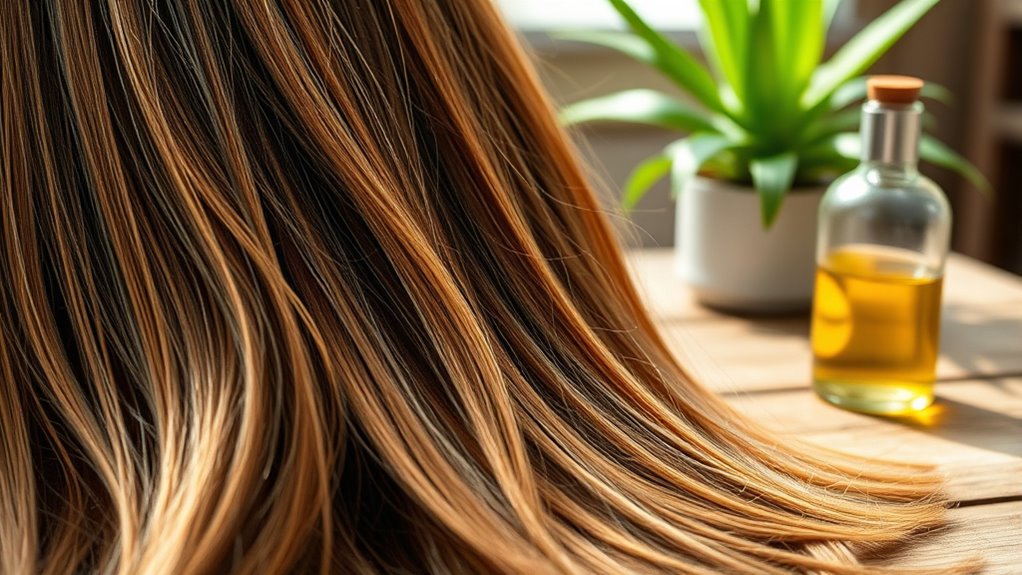
If you’ve noticed your hair looking dull and feeling dry, it’s likely due to the loss of natural oils that keep it healthy and vibrant.
To combat the effects of sun damage, start using moisturizing shampoos specifically formulated for dry hair. This helps retain hydration while you wash.
Using moisturizing shampoos designed for dry hair can help retain essential hydration and combat sun damage effectively.
Regularly apply deep conditioning treatments with Argan or Jojoba oils to greatly restore your hair’s texture and shine. Reducing how often you wash your hair can also help maintain healthy hair by keeping moisture locked in.
Incorporate a weekly hydrating hair mask, like the Moroccanoil Intense Hydrating Mask, to boost moisture levels.
Finally, finish your routine with a leave-in conditioner to enhance manageability and combat that sun-damaged hair look.
Managing Frizzy Hair for Better Control
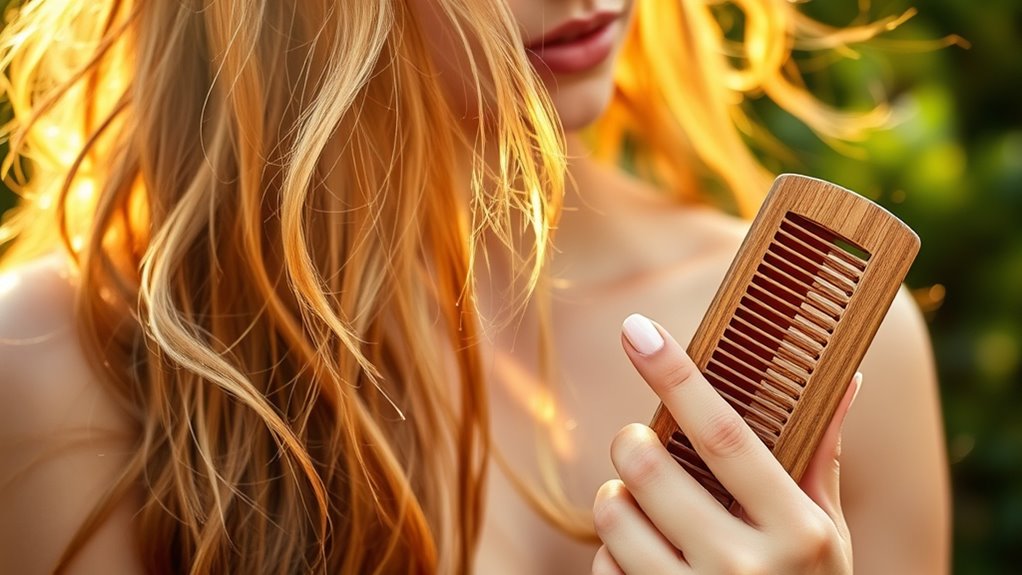
Managing frizzy hair starts with the right hydration and moisture retention techniques.
Rinsing your hair with cold water after washing helps seal the cuticle, locking in moisture and reducing frizz.
Tips for Reducing Frizz
Frizz can be a real challenge, but with the right approach, you can tame those unruly strands. Start by incorporating these tips into your hair care routine:
- Use moisturizing shampoos and conditioners designed for frizzy hair to hydrate and smooth your cuticle.
- Rinse your hair with cold water after washing to close the cuticle, reducing frizz and boosting shine.
- Apply leave-in conditioners and anti-frizz serums for extra moisture and protection against humidity.
- Always utilize a heat protectant when styling with heat tools to prevent damage that can worsen frizz.
Regular trims help keep your hair healthy by removing split ends.
With these strategies, you’ll be well on your way to managing frizz and enjoying smooth, sun-kissed locks!
Hydration and Moisture Retention
To keep your hair looking its best, hydration and moisture retention are essential, especially when battling frizz.
Start by using moisturizing shampoos and conditioners that lock in hydration and prevent moisture loss. Incorporate leave-in conditioners or detanglers to create a protective barrier against UV damage.
Rinsing your hair with cold water after washing helps seal the cuticles, making your hair smoother. Regularly applying hair masks rich in natural oils, like argan or coconut oil, can deeply restore and nourish your strands, improving their texture.
Don’t forget to treat your scalp with massages to boost circulation and enhance moisture retention.
Finally, avoid heat styling tools to maintain your hair’s natural moisture balance, keeping it healthy and vibrant.
Long-Term Strategies for Hair Health and Protection
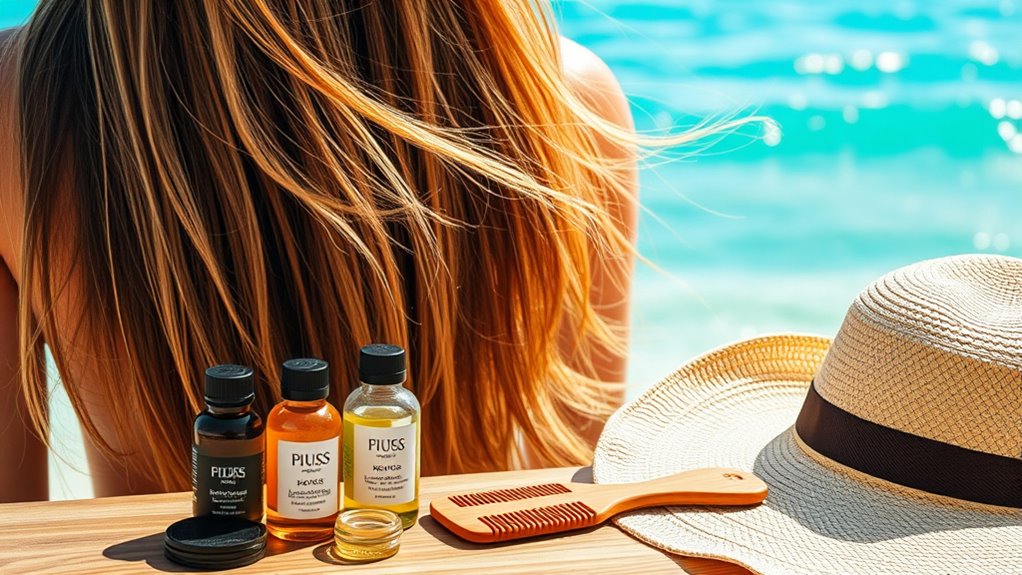
While sun exposure can wreak havoc on your hair, implementing long-term strategies can help restore and maintain its health. To protect your strands from UV damage and enhance hair health, consider these tips:
Sun exposure can harm your hair, but with the right strategies, you can restore its health and protect it from damage.
- Invest in high-quality, UV-protective hair care products.
- Incorporate deep conditioning treatments and hydrating masks weekly.
- Wear protective styles like braids or buns to minimize direct sunlight exposure.
- Schedule professional salon treatments for deep repair.
Remember to avoid overwashing your hair, as it can strip natural oils.
Regularly assess your hair’s condition to adapt your care routine, ensuring it meets the evolving needs of sun-damaged strands.
With consistent care, you’ll achieve stronger, healthier hair that can withstand the elements.
Frequently Asked Questions
Can You Reverse Sun Damaged Hair?
You can’t completely reverse sun-damaged hair, but you can improve its condition.
Start by using deep conditioning masks and moisturizing products to restore hydration. Regular trims will help eliminate split ends and keep your hair looking healthy.
Incorporate reparative products with keratin and protein to strengthen strands, and use UV protective products to prevent further damage.
A balanced diet rich in vitamins will also support your hair’s recovery from within.
How to Repair Sun Damaged Hair at Home?
You might feel overwhelmed by your hair’s condition, but don’t worry; you can bring it back to life at home!
Start with deep conditioning treatments to restore moisture and texture. Incorporate nutrient-rich oils like coconut or jojoba for intense hydration.
Limit washes to keep natural oils, and choose sulfate-free products. Regular trims remove split ends, while leave-in conditioners protect against future damage.
Embrace these steps, and watch your hair transform!
Is Sun Damage on Hair Permanent?
Yes, sun damage on hair can be permanent, especially if the exposure is extensive.
Prolonged UV exposure weakens hair’s structure, leading to issues like breakage and split ends that mightn’t fully heal.
While treatments can temporarily improve dryness and dullness, the actual damage to keratin and protein bonds may remain.
Regular trims and consistent use of hydrating products can help, but complete restoration mightn’t be possible if the damage is severe.
What Oil Is Good for Sun Damaged Hair?
When your hair’s been damaged by the sun, using the right oils can make a world of difference.
Coconut oil’s great for deep hydration, while argan oil restores shine and protects against further UV damage.
Jojoba oil mimics your scalp’s natural oils, helping with moisture and manageability.
Olive oil repairs split ends, and avocado oil nourishes with vitamins, promoting healthy growth.
Incorporate these oils into your routine for revitalized, beautiful hair.
Conclusion
Just like a garden thrives with regular watering and care, your hair needs the same attention to flourish. Think of sun-damaged hair as a wilting flower—without proper hydration and protection, it can’t bloom. By incorporating deep conditioning treatments and protective measures into your routine, you can revive your locks and keep them healthy. Remember, a little effort today can lead to vibrant, resilient hair tomorrow, just like nurturing a garden brings forth beautiful blooms.
